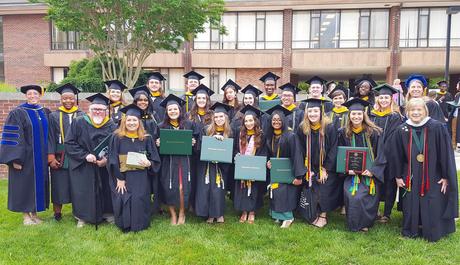 I’ve seen a lot since I taught my first class in 1993 at Anne Arundel Community College as an adjunct. As a professor at Stevenson University since 2000, and full-time since 2008, I can offer some tips to those of you who have children going off to college this year, those who are in college, and those who may be struggling in college for whatever reason. While this list is not foolproof and is certainly not complete (as I’m sure my colleagues could certainly add to it), the list merely serves as a guide for students who want to improve or are taking their first college course. Here is my list of 12 things that can help.
I’ve seen a lot since I taught my first class in 1993 at Anne Arundel Community College as an adjunct. As a professor at Stevenson University since 2000, and full-time since 2008, I can offer some tips to those of you who have children going off to college this year, those who are in college, and those who may be struggling in college for whatever reason. While this list is not foolproof and is certainly not complete (as I’m sure my colleagues could certainly add to it), the list merely serves as a guide for students who want to improve or are taking their first college course. Here is my list of 12 things that can help.
Tip 1: Be thankful for your college experience. From your sports to your extracurriculars to internships and travel abroad trips, this is your chance to absorb all you can and create wonderful memories and experiences, while also broadening your horizons along the way. Don’t hide in your room and play video games or go home every weekend. Try to enjoy the experience and all it has to offer. Meet new people, go new places, try new things. It’s all about exploration and finding your way. And be thankful for those who have helped you get here, whether they have supported you with a belief in yourself or financially. You owe it to yourself to give it your all in the college setting with gratitude to those who helped you get there.
Tip 2: Take notes in class. Do not cross your arms and sit there staring at your professor while he or she lectures. Even if there are Powerpoints, take notes. Actively engage in good note-taking in class. Scholarly studies have shown that those who take handwritten notes as opposed to those who take notes on a laptop do better in courses. Also, a laptop is a tempting piece of machinery that can distract you while in class.
Tip 3: Buy, read, and use the textbook. Having authored a textbook with my colleagues, I can assure you that much time, thought and research goes into writing one. There is a wealth of knowledge in those books, and using the textbook as a source of information for your coursework is important. Reading is so critical to all of our skills: critical thinking, writing, and our ability to analyze and summarize. Do yourself a favor and actually READ the textbook. It will be worth the investment.
Tip 4: Actively engage in your learning environments. Whether you are in a classroom, a lab, a lecture hall, fraternity or sorority, or a club or organization on campus, be a part of it. One of my favorite quotes is this: Wherever you are, be all there. This couldn’t be truer for college students. Be present, be engaged, and be excited to learn.
Tip 5: Leave the cellphone behind during class. Unless the course is using the cellphone for interactive work in class, put your phone away. It’s difficult enough to keep students engaged and interactive without having to compete with a device. Being able to focus on the learning that is happening in class leads to better grades, comprehension, and experiences.

Tip 6: Budget your time well. One of the things that I see as the downfall to most college careers is a student’s lack of ability to budget time well. Being able to set study schedules, group work times, commitments on campus, and time to have fun is typically a reason why most students can’t survive.
Tip 7: Get organized & plan. This one goes hand in hand with budgeting your time. It’s important to do that, but it’s equally important to be organized. Keep your files, notes, syllabi, and assignments organized. Come up with a system that works for YOU. Just because your roommate takes notes in different color pens doesn’t mean that will work for you. Create a system and stick with it. You get to drive the organization bus.
Tip 8: Read and understand the syllabus. The syllabus is the “agreement” or “contract” you make with your professor for that semester. All details should be in the syllabus regarding the course, its structure, the timetable, and when assignments are due. Keep this as your guide for the course. When something isn’t clear, ask about it in class. But the syllabus is the guide map for what will happen throughout the semester.

Tip 9: Go to class. I know this sounds ridiculous to have to include this on a list, but the amount of absences in college classrooms is sometimes alarming. There is much learning that is jam-packed into a 50-minute or hour and fifteen-minute class. The syllabus is built to cover a lot of ground during a semester. Additionally, if you miss class, please don’t ask the professor if you “missed anything.” If you were absent, you missed something. Ask fellow students what you missed so you can catch up, or if you know you will miss, ask them to take notes for you. Consistently missing classes shows a lack of engagement and care and can ultimately affect your course grade.
Tip 10: Be on time. As it reads on my own syllabus, being late is a sign of disrespect to the teacher and fellow students and shows a lack of care. As Tom Hanks so aptly put it at the end of his Golden Globes speech on Sunday: “Show up on time, know the text, and have a head full of ideas.” This pretty much works in any setting, for sure, but also in the college classroom.
Tip 11: Be curious; ask questions. Curiosity is a sign of intelligence. If you read something that’s interesting or need clarification on a theory or idea, do a Google search to find out more information. If you understand, but would like the professor to offer another example or you need further guidance, ask about it in class. A professor’s goal is always to help students understand. If something’s unclear, we want to help students understand it.
Tip 12: Don’t compete with others; we all have our own timetables. Whether you are an older student in the classroom or a younger one, it’s sometimes difficult not to compare our paths to those of others. Please remember: we are all on our own timetables for completion. If you have changed your major, you may need to stay an extra semester or take summer courses to catch up. If you work full time, you may need to back down the amount of classes you take each semester. If you are in a 4+1 program, things may be different for you. I have students in their late twenties tell me they feel so much older than the other students. Listen: I can relate. It took me four years to get my first master’s degree because I was working 80-hour weeks at the Orioles, and I earned my second MFA degree in my forties. Please—for your own sake—don’t compare. Remember the famous quote by Teddy Roosevelt? Comparison is the thief of joy. Trust in that, which leads to my bonus tip…
Bonus: Have fun! You are a college student. You have more freedom than you’ve ever had! And although that freedom comes with responsibility, it’s a great time in your life to enjoy the journey and have fun.
I wouldn’t be a college professor if some fun didn’t come along with the work. I enjoy my students, my job, my colleagues, my university, and the experience of being a college professor. I hope you enjoy or will enjoy your college experience just as much.
xx,
Stephanie

